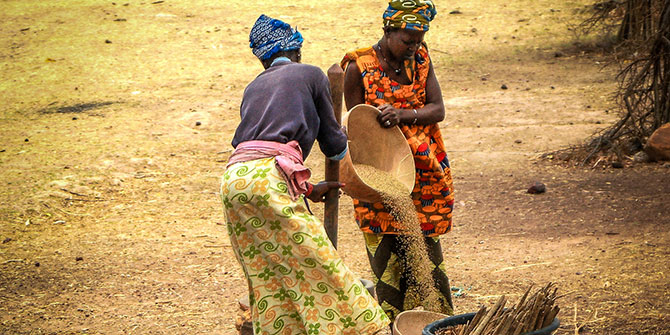In December 2019 Rwanda announced its decision to remove VAT from sanitary products to make them more affordable. While a tremendous victory for advocates striving to end period poverty and institutionalised discrimination, for many women and girls questions remain around sanitary products’ affordability and accessibility. Ynis Isimbi sits down with Rwanda’s Minister of Health, Dr Diane Gashumba, to discuss the challenges.
The context
In 2013, the East African Legislative Assembly passed a resolution urging members of the East African Community (EAC) to abandon their taxes on sanitary pads. Rwanda has now joined Kenya and Tanzania in waiving this tax.
Rwanda has a reputation for its dedication to empowering young girls and women and striving for gender equity and justice. In fact, Rwanda currently holds the title for most women in parliament in the world – at 61.3%.
Products considered a necessity are tax exempt in Rwanda, such as medical equipment, education supplies and agricultural inputs. While the merits of condoms will not be contested, it was baffling that they should be value added tax (VAT) exempt, and oftentimes free, while women must pay 18% VAT for sanitary products they will use every month.
While to the privileged the implications of period poverty may not seem so consequential, the effects are concerning. In 2017, 18% of young girls and women were unable to attend school or work because they could not afford sanitary products. This correlates to an estimated loss of RWF 98.3 billion ($115 million) of GDP a year. This is not only an issue of injustice, health and dignity, but this is also a detriment to Rwanda’s economic growth. Period poverty further marginalises girls and women from low income families and perpetuates the systems of gender inequality.
To address school absenteeism and dropout rates due to period poverty, Icyumba Cy’umukobwa (The Girls Room) was introduced in schools, an initiative by the Ministry of Education in collaboration with the Ministry of Health and the Ministry of Local government.
Icyumba Cy’umukobwa offers a safe space for young girls going through menstruation offering free sanitary products and other basic necessities, such as beds, pain relievers and towels while they are school. In addition, these rooms are often attended by experienced female advisers that can help young women navigate the challenges of menstruation.
This initiative has had a positive impact on dropout rates and absenteeism of young girls in school. However, there are still challenges of having fully equipped rooms. Furthermore, while Icyumba Cy’umukobwa addresses absenteeism and school dropout, it begs the question: what about those young girls and women not in school?
The Win
So, what led to the removal of VAT on sanitary products? Moreover, what brought about this victory after years of campaigning and policy trials? What was different this time?
I sat down with the Rwanda’s Minister of Health, Dr Diane Gashumba, to understand the drive to remove VAT on sanitary products and the context that allowed this rapid development.
‘At the beginning we thought Icyumba Cy’umukobwa was enough, but we didn’t think about the girls who weren’t attending schools. In addition, while the policy is there it’s not implemented in all schools,’ said Dr Gashumba.
She explained that while the government had been working to address this issue for some time, what really turned the tide was the engagement of Rwandan youth demanding change now.
One course of action on the table is subsidising local manufacturers to produce sanitary products at a lower price. The issue was ensuring these products met Rwandan health standards.
An unexpected champion
The cause found an unforeseen ally in the Minister of Justice. A father of multiple daughters himself, Minister Johnston Busingye challenged the Social Cluster – a committee of representatives from other ministries pertaining to social issues – to remove the VAT on sanitary products. With the support of the Minister and other stakeholders, a proposal was sent to the Ministry of Economic Planning and Finance and the exemption was approved.
‘In Rwanda, when the rationale is there, it’s just the matter of writing to the right institution, which in this case was the Ministry of Finance, and then it’s done,’ Dr Gashumba said.
Grassroots movement
As Dr Gashumba herself recognised, this movement and pressure from young activists were at the core of this win. Their passion and fight to end period poverty did not go unnoticed.
Activists like FreeThePeriod campaign continue to work on bringing an end to injustices faced by young girls and women in Rwanda. Its founder, Isabella Akaliza, describes the campaign as a ‘grassroots initiative aimed at ending period poverty. We do this through raising awareness, advocacy and lobbying policy makers to create policies that create equal access to period products.’
Celebrating the news, Isabella said, ‘the removal of VAT is something that we have passionately advocated for. We believe that the tax was discriminatory, products that are VAT exempt are deemed necessities: period products are a necessity and should therefore be exempt. The removal of VAT is a great step towards ending period poverty because it reduces the price of pads. However, we recognise that there is still a lot of work to be done if we are to make all period products free.’
Moving forward
This win encourages advocates to continue fighting the good fight. Though, there’s more work to be done. Yes, a burden has been removed but how accessible are they? Can young girls and women from low income households afford them?
Period poverty is a reflection of society’s unjust inequality of gender. It is more than removing VAT on sanitary products, and it is about dismantling the unjust systems that marginalise, exclude and deny access to education and jobs – it’s about normalising menstruation, it is about freedom, period.
This post was first published on the LSE Department of International Development blog.
Photo: On International Women’s Day 2017, UN Women Rwanda, UNCHR, the government of Rwanda and development partners officially open inaugurate the Women and Girls Opportunity Center at the Mahama Refugee Camp. ‘International Women’s Day 2017 – Rwanda’ by UN Women/Tumaini Ochieng is licensed under creative commons.





